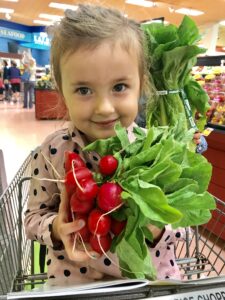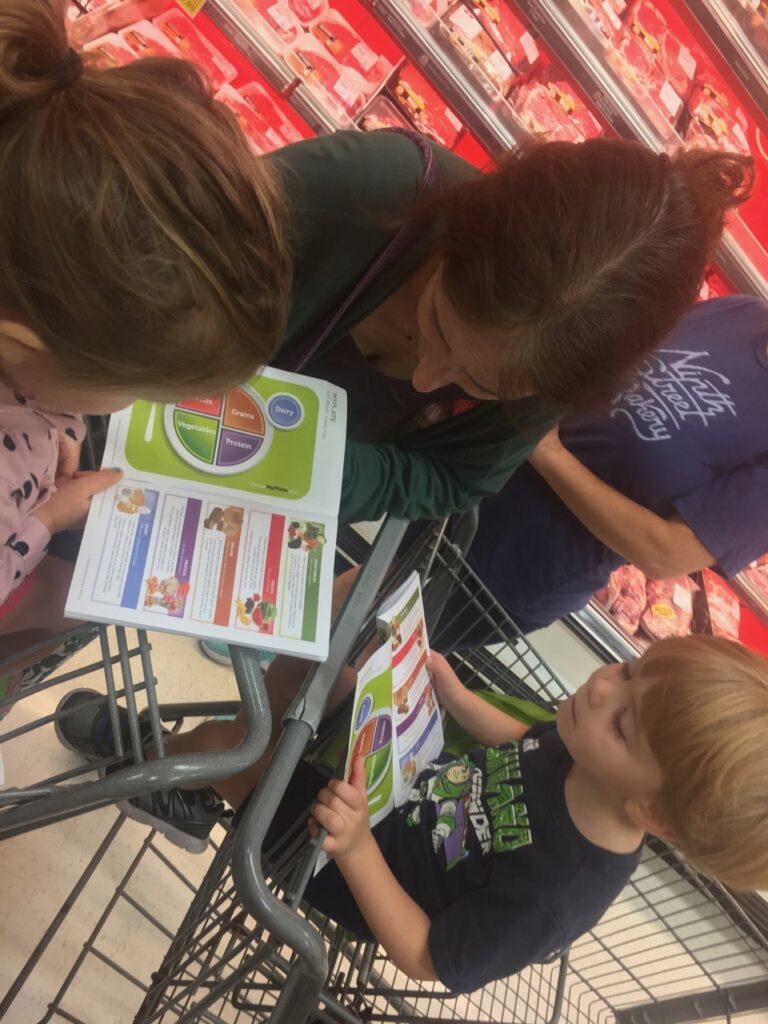It’s Tuesday morning at the Great Barrington Price Chopper,  and a collection of moms and toddlers are clustered by the carts outside. They’ve gathered for Cooking Matters at the Store, a free grocery store tour program of the Share Our Strength organization, leaders of the No Kid Hungry campaign). Tour leader Jesse Mushenko, a coordinator with Cooking Matters Massachusetts, helps families make the best use of their SNAP benefits to make nutritions meals and snacks.
and a collection of moms and toddlers are clustered by the carts outside. They’ve gathered for Cooking Matters at the Store, a free grocery store tour program of the Share Our Strength organization, leaders of the No Kid Hungry campaign). Tour leader Jesse Mushenko, a coordinator with Cooking Matters Massachusetts, helps families make the best use of their SNAP benefits to make nutritions meals and snacks.
Jesse tours grocery stores with families eager to stretch a grocery dollar and make smart food choices. Today’s audience is the “Play and Learn” group from CHP’s Family Services program; Family Services, through its WIC nutrition program, is always looking for ways to help families eat well. Jesse has planned the “short version” of his tour so the children can enjoy their cart rides and then get on to their playgroup the CHP Family Services building nearby.
 “Families on a tight budget report that the cost of healthy groceries is their biggest barrier to making healthy meals at home,” says Paloma Suarez, senior nutritionist at CHP Family Services. “Food skills, like smart shopping, can help overcome that barrier.” CHP also runs a six-week bilingual “Cooking Matters,” a hands-on cooking class at CHP’s kitchen, down the road.
“Families on a tight budget report that the cost of healthy groceries is their biggest barrier to making healthy meals at home,” says Paloma Suarez, senior nutritionist at CHP Family Services. “Food skills, like smart shopping, can help overcome that barrier.” CHP also runs a six-week bilingual “Cooking Matters,” a hands-on cooking class at CHP’s kitchen, down the road.
After Jesse’s introduction, seven small munchkins pile into shopping carts maneuvered by moms, and he leads the caravan inside. He takes up a presentation spot in the produce section, framed by the harvest colors of fall, near the peaches and berries. In the produce aisle, it’s easy: everyone knows, fresh fruits and veggies are tops for nutrition. What some didn’t know is that frozen fruits and veggies, packed at the peak of ripeness, are the next best choice when fresh is not available. And canned fruits and veggies can be the best value for quick recipes and snacks – so long as shoppers check the ingredients to avoid added sugars or salt.
So, how to get the best produce bang for a buck?
 Carrots: Should you buy them ready-to-eat and packaged in a bag, or grab a farm-fresh bunch that you peel yourself? Organic or not? Price may make that an easy call, but today, a pound of organic carrots is just $1.49. Jesse helps moms decipher the value of a pound — is it a pound of ready-to-eat, or do-it-yourself carrots? Ready-to-eat may be best. And speaking of veggies — in-season veggies are cheapest (like the organic carrots) and can be frozen for later.
Carrots: Should you buy them ready-to-eat and packaged in a bag, or grab a farm-fresh bunch that you peel yourself? Organic or not? Price may make that an easy call, but today, a pound of organic carrots is just $1.49. Jesse helps moms decipher the value of a pound — is it a pound of ready-to-eat, or do-it-yourself carrots? Ready-to-eat may be best. And speaking of veggies — in-season veggies are cheapest (like the organic carrots) and can be frozen for later.
On to the meat aisle: Lean ground beef is healthier but more expensive per pound. But moms say higher fat beef holds together better for a hamburger. Solution: If fat content is a concern, buy lower fat beef for burgers and add an egg white to keep it together on the grill. Consider ground turkey, too — it’s lower fat, and relatively inexpensive. In the  bread aisle: Jesse grabs a loaf, and so do the moms. Whole grain is healthiest. “Multi-grain” sounds good, but is usually not “whole” grain. Fiber content is healthy, so look for it.
bread aisle: Jesse grabs a loaf, and so do the moms. Whole grain is healthiest. “Multi-grain” sounds good, but is usually not “whole” grain. Fiber content is healthy, so look for it.
In bread, peanut butter, juices, cereals, tomato sauce: look for the sugar content. Is it one of the top five ingredients? A gram equals four teaspoons of sugar, so divide total grams by four (40 grams = 10 teaspoons of sugar — would you eat 10 teaspoons of sugar?)
Best cooking oils? Those lower in saturated fat — olive oil, oil produced from nuts (sunflower oil), canola oil — any oil that remains liquid at room temperature. Highly saturated fats — butter, coconut oil — which remain solid at room temperature are not as healthful, according to Jesse, but the confusion around the so-called magic of coconut oil has the moms scratching heads.
In the dairy aisle, everyone gets excited as Jesse tells us to grab the yogurt we usually buy for our families. One of the CHP leaders grabs the Greek yogurt, thinking the sugar is significantly less that other brands. But, Jesse enlightens her, pointing out that although it contains less sugar than most, there’s still the equivalent of three packets of sugar in there! Jesse goes over milk, yogurt, almond milk — comparing fat, sugar, protein, and vitamin D. Store brands for anything are usually less costly.
The tour wraps up, and everyone asks Jesse to come back for another tour, or to CHP for a Q&A.
As Jesse hands out reusable grocery bags and $10 gifts cards, he promises to return soon with his grocery store wisdom!